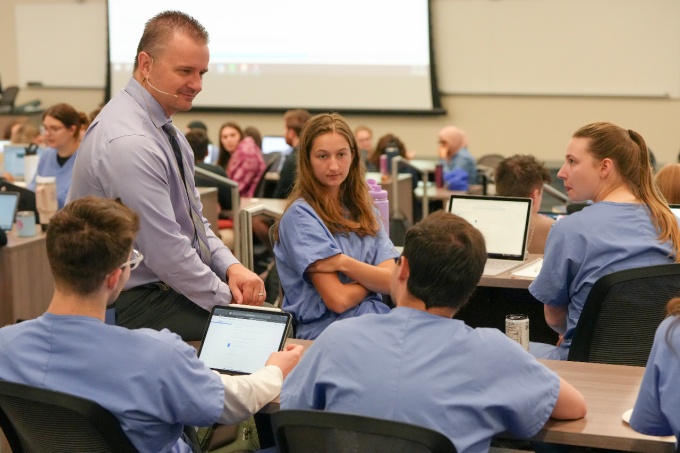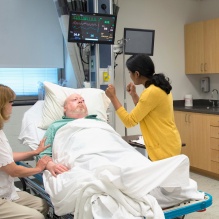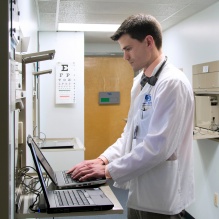
Phase 1 of our curriculum goes well beyond your expectations. In small groups with faculty facilitators, continually expand your expertise and develop rigorous and repeatable approaches to problem-solving.
Phase 1: Build Foundational Skills
We understand: Context counts. Phase 1 of our program enables you to learn in context — helping you better appreciate the relevance of disciplinary knowledge and skills, and increasing your motivation and engagement. Plus, early experience in the clinical world can set you up for a seamless future transfer from student to practicing physician.
Phase 1 is the 14-month first segment of our program. It’s fueled with learning opportunities to help you build foundational skills that will be critical to your mastery of the work awaiting you in the second phase and third phase of our program.
Here’s the exciting thing about our redesigned program: It’s carefully built on specific curricular pillars and threads that deeply enrich your understanding of medicine in today’s world.
- Pillars are: foundational sciences, clinical sciences, health systems science, humanities and humanism (including anti-racism and cultural humility), and scientific literacy and inquiry
- Curricular threads are: anatomy, anti-racism, biomedical informatics, ethics, genetics, heath maintenance and disease prevention, histology, microbiology, pathology, pharmacology, social determinants of health
In mid-July, you’ll delve into a course called Medicine and Society. In it, you’ll begin the process of professional identity formation, learn about the Buffalo community and explore significant health problems within Buffalo (and beyond!) in a holistic way.
This course also provides a general introduction to our curricular pillars and select curricular threads that will be reinforced throughout your four years of training.
During the first semester of Phase I, you will gain fundamental science knowledge in our Foundations of Medicine course. We’ve thoughtfully designed the curriculum to ensure clinical applications are the scaffolding for everything you learn — so you’ll understand early on how your newfound knowledge can fit into your future practice of medicine.
Once you finish Foundations of Medicine, we’ll supply you with courses based on integrated organ systems in the homeostasis blocks and continue with endocrine, reproductive, neuroscience and behavior blocks. These will equip you with indispensable knowledge about areas including anatomy, embryology, histology, pathology, physiology and pathophysiology. Concurrently, you will sharpen your understanding of health systems science, humanities/humanism, as well as scientific literacy and inquiry in courses covering these areas.
The case-based inquiry learning you’ll experience throughout Phase 1 is an especially exciting facet of our program. You’ll be a clinical problem solver on a small team while receiving narrative feedback from a faculty facilitator.
How does it work? Twice weekly, you’ll meet with a small group that’s student-led and faculty-facilitated. You’ll dissect a clinical case, determine learning goals as a group, research answers to these questions, and come back together to share knowledge with the group.
Through our Foundations of Patient-Centered Care course, you’ll begin developing the clinical skills you need to become a competent, compassionate professional.
We’re proud our new curriculum gives you early opportunities to hone skills in patient interviewing/communication, physical diagnosis and clinical documentation — all with an emphasis on patient-centered care for diverse populations. A supportive teamwork environment matters, so your learning community will serve as the infrastructure for this course, which spans all of your Phase 1 training.

Three two-week clinical immersions empower you to take the information you’ve learned and contextualize it in inpatient, outpatient and procedure-based clinical settings. These immersions will help you:
- integrate all aspects of medical practice — including social determinants of health, patient experiences, interprofessional education, health systems, foundational sciences and clinical skills
- prepare you to provide more discipline-specific care in the clinical clerkships you’ll undertake in Phase 2 of our program
We know that as a future physician, you value the chance to help improve the environment around you. That’s why — for one afternoon, every other week, through your learning community — you can expect to engage in a longitudinal service-based learning experience.
This undertaking lets you connect with and support a Buffalo community organization in worthwhile ways, all while making a direct impact on our community’s health inequities.
Eager to fill your summer with endeavors that interest you? Thanks to our new curriculum, you’ll have the option to embark on work in a patient care setting or community health organization, engage in research or begin your mentored health science scholarly project. Starting in June, you can devote approximately seven summer weeks to the optional pursuit of your choice.

Being a physician-scientist is critical in today’s world. So, as part of the Scientific Literacy and Inquiry Pillar, you will develop a proposal to pursue and complete a health sciences scholarly project (HSSP).
We think you’ll find this mentored project thrilling, and here’s why: It’ll intensify your scientific curiosity. It’ll boost your skills in self-directed learning. It’ll sharpen your communication skills via a presentation prior to graduation. It’ll help you foster a rewarding relationship with your faculty mentor. And best of all, it’ll whet your appetite for career-long learning.
Keep in mind: If you complete a concurrent advanced degree program such as the MD-PhD Program or the master’s program in public health, you won’t need to do a separate health science scholarly project, since these programs have built-in research project components that will satisfy this requirement. Certain elements of the HSSP will still need to be completed, like the presentation, to fulfill the course requirements.
We know you may be anxious about the USMLE Step 1 exam. But rest assured: You can feel confident and ready thanks to the preparation course and dedicated study period we’ve built into our curriculum.
In January and February of your second year, Phase I will conclude with a course that supports you with structure and guidance as you prepare for and take the USMLE Step 1 exam.

Our Well Beyond curriculum enables you to learn through service to disinvested communities facing barriers, with many community members challenged by significant health and social inequities.
Service learning combines community service with explicit learning objectives, preparation and reflection. As a Jacobs School medical student, you’ll provide direct community service while learning about the context in which the service is provided, the connection between the service and your academic coursework, and your role as a citizen.
CommunityConnect is a core educational experience embodying a bidirectional relationship. This means that as a student, you can support the needs of communities and their members — all while enriching your own understanding of our Buffalo communities and neighbors.
By participating in CommunityConnect, you’ll have opportunities to:
- serve as a liaison ambassador between the Jacobs School, health care and the community
- understand structural aspects, processes, strengths and challenges of CBO and its community work
- appreciate structural and social determinants of health impacting individuals and communities served
- develop proximal working and service relationships with CBO staff and community members
- participate in advocacy, community education and other associated activities to aid the CBO and/or its causes and work
- understand health experiences of community members
Through CommunityConnect, you’ll feel the benefits of engaging in longitudinal community service with a Buffalo community-based organization (CBO), as these partners can:
- help you, as a student ambassador, understand and connect with community/members through community-facing work
- take multiple student ambassadors two to four times per month
- provide service learning work for three hours weekly, every other week
- connect you with community members for health care discussions
- give feedback on your participation
Community partners
Our community partners include:
- Compeer Buffalo, which provides social support in the form of friendships to individuals (age 6 and up) who are striving for mental well-being
- Big Big Table Community Café, which provides a dignified response to food insecurity and hunger in Buffalo by providing our community with accessible, affordable and nutritious meals
- Buffalo Prenatal Perinatal Network, which focuses on improving pregnancy outcomes; promoting better maternal and infant / child health care; establishing better linkages between existing programs; and ensuring that families have access to the full range of preventative and primary health care, social support and educational resources in Erie County
- GObike, which has a mission to promote active mobility options, trails and greenways, and complete streets in Western New York — and connects and empowers communities through advocacy, education, planning and engagement
CommunityConnect enables you to serve on teams of three, with each team attached to a community-based organization (CBO).
As a first-year student, you’ll work with your CBO one day for three hours every other week, for three semesters.
To better address the issue of continuity of service, second-year student teams will continue to support their CBOs into their second fall semester while onboarding the incoming first year team before the second-year teams finish their fall semester and leave the CBOs.
Second-year students will continue their service learning in the first and third weeks of their fall semester as a way to orient new first-year students. Following the first month, second-year students will alternate weeks with first-year students, doing their service learning hours in the second and fourth weeks.
Here’s how your first two years in medical school will look:
Year 1
Visualization map for year 1 (click to zoom).

